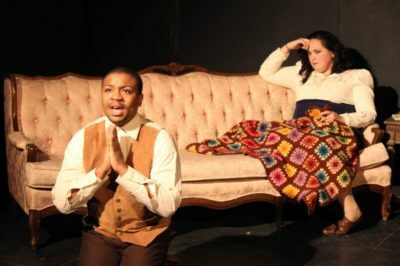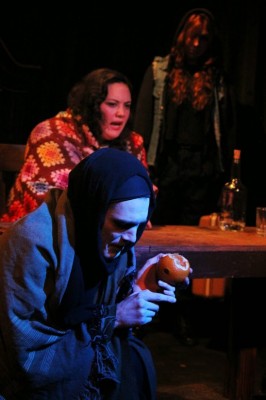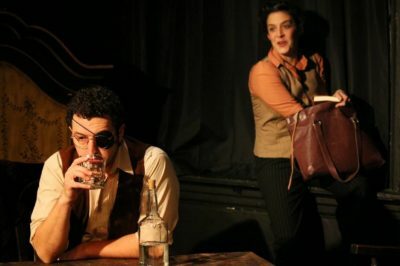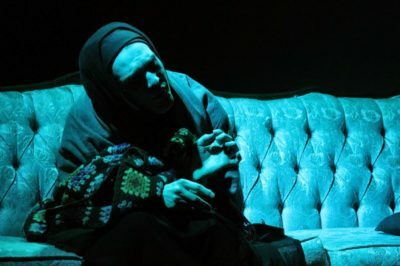A Bright Room Called Day
By Tony Kushner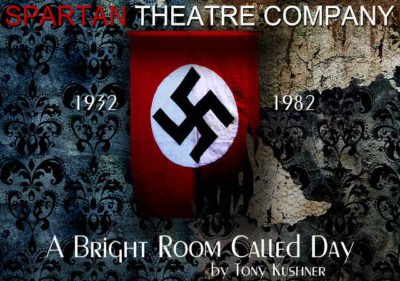
Directed by Laura Elleseg
Produced by Spartan Theatre Company
Up and Coming Theatre Company Conquers Complex Work
Spartan Theatre Company takes its names from its minimal budget and aesthetics. The company was founded in 2012 by three Roosevelt University alumni. Therefore, they deserve especially high praise for their excellent production of Tony Kushner’s 1980s work A Bright Room Called Day, now playing at Chemically Imbalanced Theater.
The story begins on New Year’s Eve going into 1932. Agnes Eggling (Amanda de la Guardia) is a film character actress hosting her leftist friends at her apartment. She has a wry boyfriend, Vealtninc Husz (Guy F. Wicke), who lost his eye in the 1919 Hungarian uprising and was forced to flee the Soviet Union for supporting Trotsky. Another friend, the painter Annabella Gotchling (a no-nonsense Naomi Mark), is still fiercely dedicated to the Comintern and insists on purely economic analysis. This sets her at odds with Baz (David Guiden), a gay anarchist who sees everything in terms of sex and gender, and Paulinka Erdnuss (Alexandra Gonzalez), an opium smoker who abandoned leftism to further her own movie career and thinks herself a nihilist.
Partly to keep up with her friends, partly out of boredom, and slightly out of principle, Agnes decides to dedicate herself to the Communist Party of Germany. Though she can’t be a party member yet, she is allowed to create an agit-prop skit for striking workers. Though she finds the propaganda boring, Agnes does enjoy feeling like she’s contributing to history. However, party officials (James Romney and Emma Sharp) soon arrive to tell her to change the play, since it is now politically incorrect in light of new instructions from Moscow. Agnes points out that a lot more proletarians seem to be going over to the Nazis than the communists. The party representatives bicker over their convoluted, fanatical politics, and assure Agnes that the worse things get, the better. There is no need to work with compromisers, because a Nazi government would obviously discredit itself within months of taking over and lead to a communist revolution. We know how that goes. The friends’ relationships soon crack under the strain of persecution, and the guilty knowledge that each of them has failed the most important challenge of their lives.
Being a Kushner play, the story’s not totally naturalistic. In between the action in the 30s, American Zillah Katz (Jaci Kleinfeld) monologues about her decision to flee America for Germany in the 80s. Of course comparing Reagan to Hitler is an exaggeration, she says, for now, but why does somebody have to equal to the greatest evil of all time to be called evil? Zillah is proud to be paranoid enough to look for messages in the Book of Revelation. Better safe than sorry. Contrasting Zillah is a crone (Andy Monson), who haunts Agnes’s apartment and recites nursery rhymes about demons. The crone never fled disaster and so had to live through it, reducing her to the ghostly figure she is now.
All the actors perform beautifully, but I was especially impressed with de la Guardia and Monson. De la Guardia’s Agnes is bubbly and the glue in her circle of friends. Though she lacks the political expertise of the other characters, she has firm convictions. But de la Guardia also carries her hardening over the course of the play into somebody nearly unrecognizable. Monson has a physically intense role as the crone implied to be Agnes’s future self. This production has him scampering in through the window and over furniture, and always chewing out of desperate hunger. He also has a scene playing the devil, who is depicted with a bad leg and an elegant suit. Monson’s devil suffers the sort of seizures usually associated with those he possesses, and his gripping description of his life’s story and present business in Berlin is an exciting conclusion to Act I.
Laura Elleseg’s direction keeps a story with lots of politics and philosophy moving briskly. Some of Kushner’s scenes feel too short, but the sheer number of them required an able director to maintain a sense of menace and perspective, which she does. The show does not feel its length. Though there is little set, lighting designer Kenton Gott and sound designer Tim Bickel aid the paranoid tone the story develops, especially in Monson’s scenes. Adrienne Agnew contributed some delightful puppets.
This show was a bold choice for such a young company, and they do it justice. So soon after the mid-term elections and right before the expected beginning of the presidential campaign, the story raises many questions the audience will be worrying about. When is compromise necessary, and when is it harmful? How do you know when you should flee, or stay? Are the other people in your camp really on your side? Are your friends? This play is an excellent choice for anyone concerned with messy, confusing politics, and if you’re not, it will show you why you should be.
Highly Recommended
Jacob Davis
[email protected]
Reviewed November 7, 2014
For more information, see A Bright Room Called Day’s page at Theatre in Chicago.
Playing at Chemically Imbalanced Theater, 1442 West Irving Park Road, Chicago. $15 on the first two weekends, and $20 on the final weekend, $10 for industry and students with I.D. Runs November 7-23, Friday and Saturday at 7:30 pm and Sunday at 3:00 pm. Running time is two and a half hours, with one intermission.

